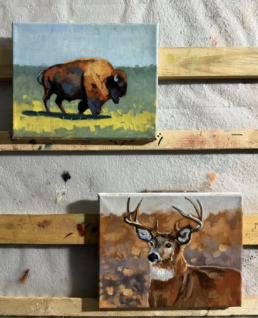For many artists, finding the right gallery to represent you and your art can be an intimidating process. But the reality is this, unless the galleries are knocking at your door, you are going to have to go knock on theirs!
Read the following helpful ideas, and get prepared to sell yourself.
Keep in mind, there is a common problem among creatives – not all visual artists have natural sales ability. In fact, many artists are rather shy when it comes to selling. This is actually the main reason why artists need art gallery representation in the first place!
So what does one do?
Below is an important check-list with questions and ideas to help you prepare yourself to find art gallery representation:
Step 1: Get Real and Ask Yourself these Questions…
- Am I ready to sell myself to a gallery?
- Is my art saleable?
- Is my art technically good?
- Have I developed a recognizable style?
- Do I have a cohesive body of work ready to display?
- Have I had success selling my work in art/craft shows, out of my studio and other non-gallery venues?
- Do I have the time to fulfill the supply & demand of a gallery?
- Do I have a website/blog that showcases my art and information? (This is not a must, but highly suggested)
- Do I have a portfolio, biobio, and resume & artist statement?
- If the answers are yes– you might be ready to take the next step toward finding the right gallery.
- If the answer is no – don’t put yourself in a vulnerable position.
“Approaching a gallery before you are ready is kind of like putting a gangly teenager in modeling school. It won’t help your self-esteem and it most likely will bruise your ego.”
Step 2: Find Your ‘Target Gallery’…
- Do-your-homework and think about where your artwork belongs in the art market. This is easy to do and you can start from home.
- Flip through art magazines and look at gallery ads and the artists they represent.
- Check out gallery websites and see if your work would be a good fit for them.
- Talk to fellow artists and have them suggest galleries to you.
- If you paint wildlife paintings I don’t advise approaching a gallery that specializes in abstract art.
Although on occasion, this might even work…I approached a gallery that mainly represented fine art glass vessels, their walls were basically bare. I showed them my still life paintings and pitched doing a series of paintings with glass vases. They loved the idea and became an important gallery for me!
- Observe the gallery through the eyes of a collector, not as an artist.
- Watch and see how the staff greets and treats you. Are they courteous and professional?
- Walk through the gallery and scan the art, look how it is hung and check the lighting.
- Ask for a price sheet if available. See if your prices are within their price range.
- Be sure and get references on the gallery from other artists. (If I am not familiar with the gallery’s reputation, I always call a few of the artists in their ‘stable’ as a referral. Be sure and ask if the gallery pays their artists in a timely fashion!)
- Try and visualize your art hanging in the gallery and see how it compares in quality to their other artists.
- Searching for the right gallery is a process of elimination.
- The more galleries you visit and research, the more informed you will be about making the right choice.
Okay, you have a short list of ‘target galleries’ that are a good match. Now what?
Step 3: Do Your Homework BEFORE You Approach Your ‘Target Gallery’.
- A successful gallery with a good reputation gets inundated with dozens of artists’ submissions each week.
- An artist must do his or her best to stand out from the crowd.
- Do your homework about the gallery’s ‘artist submission policy’ and follow their guidelines. You can usually find this on their website.
- Many galleries, especially within the high-end fine art market have specific submission requirements and policies. Which means, usually artists must submit work for review.
- Or…you can be a rebel, take your chances and do it your own way! (more helpful ideas about this in an upcoming post.)
If you follow check-list above, you will feel well prepared to approach your ‘target gallery’ and art gallery representation with confidence and good salesmanship. And remember, you are an expert about your product – because your product is YOU!
Thanks for the visit, ~Lori 🙂
*****
Please stayed tuned. In the next article I will explain my 7 creative ways to approach an art gallery for representation!
Meanwhile, I highly recommend the articles below:
How to Overcome 3 Barriers to Success as an Artist
Three Tips for Artists to Promote Themselves and Their Galleries
Should Artists Work with Galleries, Go to Direct to Collectors of Both?
How to Write a Bio that Gets Read









Thank you for quoting me.
That was very useful, Lori, thank you. I’ve been pondering if I should seek gallery representation and leaning towards working on a “cohesive body of work” before I actually do so. Your article confirmed my instincts and gave me more good info to think about.
I do have a related question. I live in an area that isn’t very rich in culture in general and artistic activity in particular (California High Desert). I can count the local art galleries with fingers on one hand. I’m also rather confident that I would not encounter a lot of difficulties if I tried to get my art into one of these galleries. Do you think it would be worth it to spend my time and efforts on one of the so-so galleries to “start with”? Or is it better to find some that are 100+ miles away but where I would have real competition and discerning clients?
It’s great to hear that this article helped you, Yevgenia! That makes all the work worth the effort. 🙂
As far as your gallery question is concerned…here is what my experience has been. Obviously, I live in a very high-end resort town community with a strong gallery influence, so this is not a direct parallel. But, I am blessed to be represented within my own town. The locals really support me and the visitors often like to purchase paintings from Idaho residents – this has helped me. In your case, the little hometown gallery in your area might be a good place to start as long as the gallery pays their artists, has nice a atmosphere, and show decent work. You never know, this might really work well for you…I would also work toward finding another gallery that really suits your art, outside of your area. As long as you can maintain two galleries, I think you should give this a shot!
Let me know what you think! Thanks again for the visit and comment.
Lori
Thanks for your advice, Lori! I can see how being in a local gallery can be a good idea. Enjoyed your story about the glass vase gallery, too!
Rejection today should not be a permanent no. Try again with a better & totally different portfolio in a couple of moths time. IF you do it all by email you should have a contact name from their original reply.
Thanks again for sharing your thoughts…those are good suggestions.
Best – Lori
This provides useful info. Thank you for posting.
Thank you for sharing about art gallery. This is very interesting. Im looking forward for further posts about these events. These make me more interested to it. Thank you for the info. Keep on updating
I see a lot of good words but where are the success stories? What think you over an idea of special art-agency that do all promo-job for the new artist? I go there with my idea and works and my money….. They do the rest. They make me world-famous expensive artist. Just like MTV works with music. Justin Biber is a good example. Why not? It is the same technology.
http://www.saatchionline.com/VladimirGent
Hello Vladimir-
Yes, art agents can be a great asset to the professional artist. I have used one in the past.
This article is aimed at helping emerging and new professional artists. The art market has been struggling and it is tough for artists to find galleries these days.
If you have a tip you would like to share about finding an agent and how it helped your success, I’d love to see it.
Thanks for the visit and comment-
Lori
Hi, I am an experienced portrait artist looking to get a couple lion pictures that I drew from a safari I did with the view of maybe doing more if they sell well. I don’t have a cohesive body of work ready to display, as you suggest, as I work on a commission basis so only have these two lion pictures. Is it still worth me approaching galleries on this basis? I have a website but am in the process of having it professionally re-designed. Should I wait until that’s done before I approach anybody? How much notice will they take of the look of the site rather than the content? There is a lot of work for them to see on my site, although it is all portraiture. Also, what exactly do you mean by a ‘bio’ and what is an ‘artist statement’? I have a very professional looking a5 printed book of my work and testimonials that I carry round with me, is that ok as my portfolio? Thanks in advance for your help.
Hello Elizabeth, thank you for your patience with me responding. I believe it is always important to put your best foot forward. Your updated website will help you look more professional and it will assist the gallery in making a decision about you. I would wait! The printed book will help, but a short bio or resume would be good too. An artist’s statement tells them about your vision of your art. I wrote about this awhile ago and will again soon…
I hope this helps. Good luck!
Lori
I have a question for Lori McNee: I was approached by an art gallery called Agora Gallery. I didn’t pursue this business nor did I ever contacted them for anything. They just sent me an email out of the blue and I am concerned that this is not a sound business idea. I read your article and paid specific attention to the area of doing your homework. I don’t believe in working without the word “contract” attached to the business deal. I am very apprehensive of any business that sounds desperate. I have been painting for many years but was never “approached” by a gallery which I didn’t target. What is your advice on this issue. I just have a feeling that this sounds too good to be true. Mostly since I went online, and did some research about this gallery, and the words large payments came up. It seems that to be “represented” by this gallery, you have to pay them large sums of money. I don’t think this is how the business works. What is your advice on this area? I have been working slowly, developing my business and marketing plans, and I don’t want to loose money.
Hello Rossana, I went ahead and answered your question via FineArtTips Facebook Fan page. I hope you got the message. Just in case you didn’t…I will quickly repeat myself. Agora Gallery is a vanity gallery. Anytime a gallery asks the artist to pay them for a showing, that gallery is not considered a commercial gallery. I am not a fan of vanity galleries. Artists already have to much overhead, and they don’t need to be paying to show. You would be better off having your own opening at a designer’s studio or restaurant. That is my opinion. I wish you the best in your decision and at whatever you decide.
Best,
Lori
hello.i live in iran..i am photoghrapher and work photo montaj and Fashion and have some work cannot show in iran..can i send my catalouge for you and help me for gallery..i donot know your email that send for you..thank you very much
Hello Saeedeh, I am not a gallery. I only share tips for artists. I hope you can find some galleries to show your photography. Thank you for visiting my blog.
Hi Lori
Thank you for posting the article, I know it is a few years old now but there are a number of relevant points. I am looking at using an agent but I am worried if I can maintain the number of pieces if I do. Another artist who uses the agent has advised me I could be looking at 1 or 2 pieces a week, which would be very hard for me to maintain. Also the commission charged by the agent will greatly reduce the amount I make from my passion. I wonder if the process will feel more like conveyor belt art rather than a work of love. These are just my thoughts and thanks again for your insight.
Lucy, I have nearly 600 comments in my inbox! About 1/3 of them are spam and I am way behind on replies. I added a new plugin and hope that helps! Thanks for your patience.
Anyway, a lot of artist survive on commissions and welcome them. I on the other hand am grateful for the work, but I find commissions to be challenging. The finished commission never quite seems as fun to paint! I am always concerned with making someone else happy and not myself. Painting is the only time in my life where I am selfish…I prefer to paint for myself. That said, I still accept commissions. Thanks Lucy! xx
Thanks Lori! Very good tips.
I think you would be better off having your own opening at a designer’s studio or restaurant.thanks for the sharing information.
Thanks for your comment!
Thanks for the good advice http://www.mccotterart.com.au junie
Happy to help!